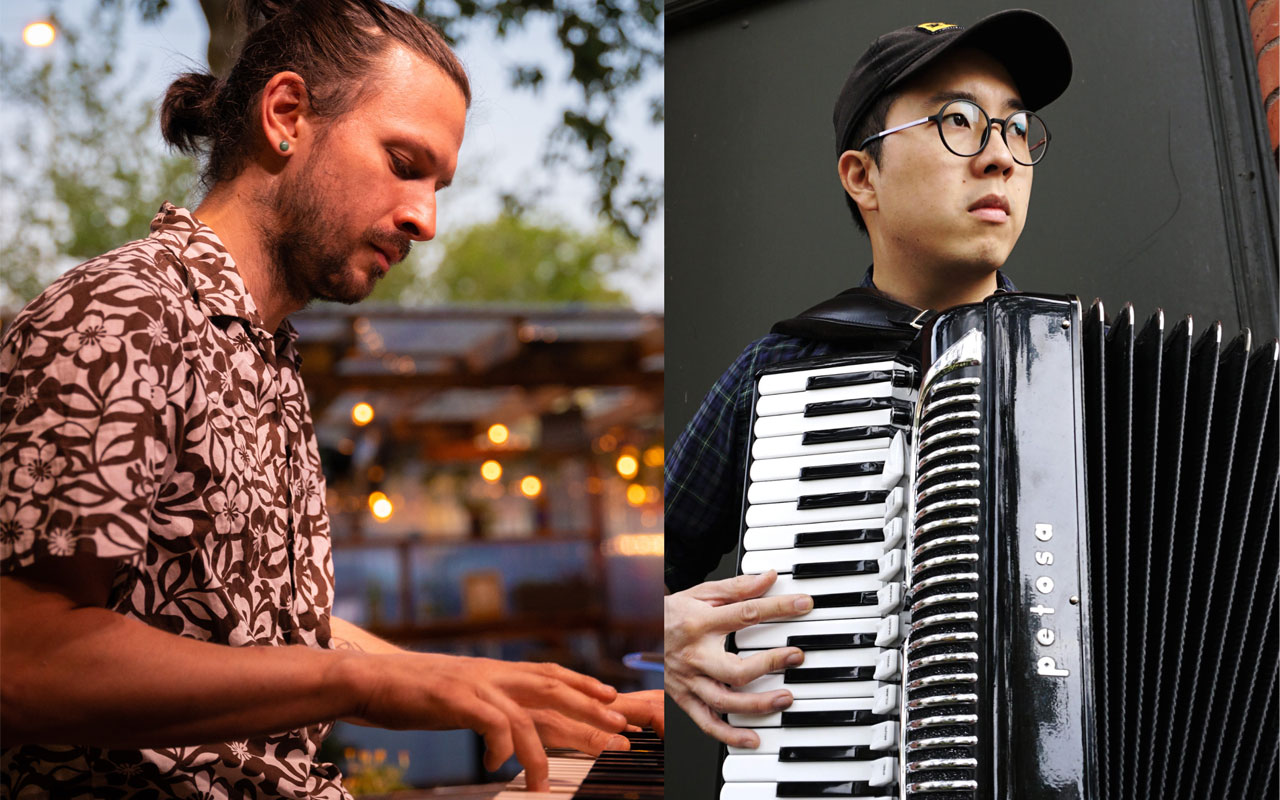
Evan Captain photo by Jake Chaplin. Josh Hou photo by Rosanna Sze
Wednesday, May 31, 8pm
The Royal Room
5000 Rainier Ave S
$15-20
According to Josh Hou, organizer of this month’s Asian American Jazz Showcase, his signature style as a Chinese American composer and accordionist traces back to an experiment.
During a Capitol Hill restaurant gig several years ago, “I was digging into ‘Jasmine Flower/茉莉花,’ an old Chinese folk tune,” he remembers. “It doesn’t have a canonical set of changes, so I played around with different harmonies to see what sounded good to my ear. I kept exploring more and more Chinese songs after that.” Hou’s synthesis of jazz and Chinese music gradually became his sonic trademark. The chamber trio arrangements of traditional Chinese songs on his debut album Bilingualism followed on the sophomore outing Feeling of Home, by a band that integrated Chinese and Western instruments.
Hou considers that fusion of cultures an artistic imperative. “So much of the jazz tradition in the past has been taking songs that are part of the popular landscape—songs from musicals, movie themes—and then improvising over them or playing with them harmonically. I wanted to do the same with music from my own heritage and tradition,” he says.
Conceived partly as a public workshop for Hou’s latest material—highlighted by a new arrangement of “Colorful Chasing the Moon/彩雲追月,” a 1935 piece by Ren Guang, whose compositions also combined Western and Chinese influences—the showcase also represents a broader Asian American musical perspective; Hou has recruited a backing band featuring Japanese American trumpeter Jun Iida and Taiwanese American cellist Alex Chuang, in addition to bassist Kelsey Mines.
For the part-Japanese American pianist Evan Captain, whom Hou has invited to lead his own set, the showcase is the culmination of a personal journey inspired by Iida.
Captain cites the influence of Nintendo composer Koji Kondo and Studio Ghibli’s Joe Hisaishi and intends to perform his own arrangements of songs from Japanese pop culture. “Mainly I wanted to take this opportunity to connect with the songs of my heritage.” Captain continues:
One in particular, ”Aka Tombo/赤とんぼ,” (sung from the perspective of a baby sitting on her older sister’s shoulders) carries particular significance for me. I was at Jazz Fellowship at Vermillion last year and saw Jun play his arrangement of this song, which got me thinking about traditional music as a way to connect across generations and culture. I started researching for songs that my grandmother might remember since her memory is slowly giving in to dementia. When I played it at her home a few months later, she lit up and clapped after each encore. I told this story to Jun later, and he remarked that this is the reason why we do what we do, as artists. Grateful to share the stage with him on this one, for sure.
Like Captain and Iida, Hou relishes the opportunity to reflect the Asian American experience in his music. “Sometimes when I play jazz standards…people will come up and be very excited to hear songs from their childhood, or songs that remind them of their grandparents,” he says. “I think that Chinese Americans, and other immigrants of Asian descent, should get to experience that too.”
While unintentional, the showcase happens to coincide with the final day of Asian American, Native Hawaiian and Pacific Islander Heritage Month. A fitting homage indeed. Tickets at theroyalroomseattle.com.